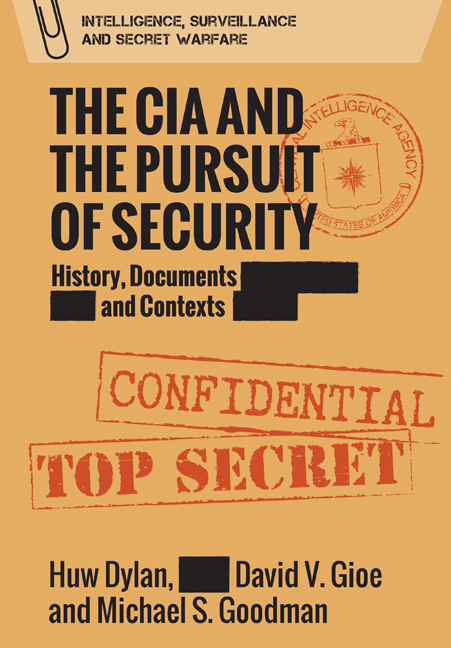Book contents
- Frontmatter
- Contents
- List of Documents
- Foreword
- Acknowledgements
- Introduction
- 1 Intelligence for an American Century: Creating the CIA
- 2 The Development of CIA Covert Action
- 3 A ‘Gangster Act’: The Berlin Tunnel
- 4 The CIA and the USSR: The Challenge of Understanding the Soviet Threat
- 5 Anglo-American Intelligence Liaison and the Outbreak of the Korean War
- 6 The CIA and the Bomber and Missile Gap
- 7 The CIA and Cuba: The Bay of Pigs and the Cuban Missile Crisis
- 8 The CIA in Vietnam
- 9 The CIA and Arms Control
- 10 The CIA’s Counter-Intelligence Conundrum: The Case of Yuri Nosenko
- 11 1975: The Year of the ‘Intelligence Wars’
- 12 Watching Khomeini
- 13 The CIA and the Soviet Invasion of Afghanistan
- 14 Martial Law in Poland
- 15 Able Archer and the NATO War Scare
- 16 The Soviet Leadership and Kremlinology in the 1980s
- 17 The CIA and the (First) Persian Gulf War
- 18 A Mole in Their Midst: The CIA and Aldrich Ames
- 19 ‘The System was Blinking Red’: The Peace Dividend and the Road to 9/11
- 20 Reckoning and Redemption: The 9/11 Commission, the Director of National Intelligence and the CIA at War
- 21 The ‘Slam Dunk’: The CIA and the Invasion of Iraq
- 22 The Terrorist Hunters Become Political Quarry: The CIA and Rendition, Detention and Interrogation
- 23 Innovation at the CIA: From Sputnik to Silicon Valley and Venona to Vault 7
- 24 Entering the Electoral Fray: The CIA and Russian Meddling in the 2016 Election
- 25 Flying Blind? The CIA and the Trump Administration
- Bibliography
- Index
11 - 1975: The Year of the ‘Intelligence Wars’
Published online by Cambridge University Press: 24 September 2020
- Frontmatter
- Contents
- List of Documents
- Foreword
- Acknowledgements
- Introduction
- 1 Intelligence for an American Century: Creating the CIA
- 2 The Development of CIA Covert Action
- 3 A ‘Gangster Act’: The Berlin Tunnel
- 4 The CIA and the USSR: The Challenge of Understanding the Soviet Threat
- 5 Anglo-American Intelligence Liaison and the Outbreak of the Korean War
- 6 The CIA and the Bomber and Missile Gap
- 7 The CIA and Cuba: The Bay of Pigs and the Cuban Missile Crisis
- 8 The CIA in Vietnam
- 9 The CIA and Arms Control
- 10 The CIA’s Counter-Intelligence Conundrum: The Case of Yuri Nosenko
- 11 1975: The Year of the ‘Intelligence Wars’
- 12 Watching Khomeini
- 13 The CIA and the Soviet Invasion of Afghanistan
- 14 Martial Law in Poland
- 15 Able Archer and the NATO War Scare
- 16 The Soviet Leadership and Kremlinology in the 1980s
- 17 The CIA and the (First) Persian Gulf War
- 18 A Mole in Their Midst: The CIA and Aldrich Ames
- 19 ‘The System was Blinking Red’: The Peace Dividend and the Road to 9/11
- 20 Reckoning and Redemption: The 9/11 Commission, the Director of National Intelligence and the CIA at War
- 21 The ‘Slam Dunk’: The CIA and the Invasion of Iraq
- 22 The Terrorist Hunters Become Political Quarry: The CIA and Rendition, Detention and Interrogation
- 23 Innovation at the CIA: From Sputnik to Silicon Valley and Venona to Vault 7
- 24 Entering the Electoral Fray: The CIA and Russian Meddling in the 2016 Election
- 25 Flying Blind? The CIA and the Trump Administration
- Bibliography
- Index
Summary
One could easily imagine a CIA officer who cut his or her teeth during the ‘golden era’ of the early years of the CIA looking back in 1975 on those heady, sometimes swashbuckling days with a fair degree of nostalgia. The fledgling agency had set a strong pace in intelligence collection and analysis, in cutting-edge technological development and in covert action, in Europe, Latin America, Asia and beyond. It had achieved notable successes; even its failures had resulted in policymakers’ concluding that it needed more money, resources and support, not less. The agency enjoyed a curious relationship with Congress and the public during those early decades. On the one hand, certainly compared to its sister services in the UK, MI5 and SIS, it enjoyed a much higher public profile. Its creation had, after all, been the culmination of a long public debate, and had been set in stone in the 1947 National Security Act. Certain issues, such as the failed operation at the Bay of Pigs in 1961, ensured that its profile never dropped too far. But, on the other hand, it had managed to sustain a cloak of secrecy over the scale of its operations and had enjoyed a significant degree of latitude from lawmakers who approved its budgets. Successive presidents had seen the agency as a tool at their disposal when dealing with all manner of issues; there had been very little pressure to create a more democratically robust system of oversight. That changed after 1975, and the fallout of ‘the year of intelligence’, when a series of revelations about the agency's activities was made public. The fallout and the attacks endured by the agency were judged by CIA officer Ray Cline to have ‘nearly destroyed its effectiveness at home and abroad’. The revelations gave rise to the infamous, though inaccurate, charge that the CIA ‘may have been behaving like a rogue elephant on rampage.’
Tolerable though the light-touch oversight of intelligence activities may have been throughout the first decades of the Cold War, by the 1970s the political, media and public mood was beginning to shift towards control, transparency and investigation.
- Type
- Chapter
- Information
- The CIA and the Pursuit of SecurityHistory, Documents and Contexts, pp. 190 - 196Publisher: Edinburgh University PressPrint publication year: 2020



